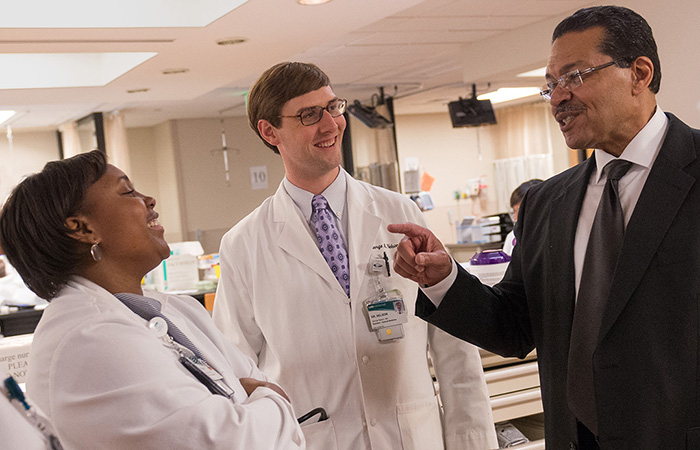Dr. Carl E. Dukes is a Nephrologist currently practicing in San Antonio, Texas, but he still refers to UAB as home. Dr. Dukes grew up in Georgia and moved up to New York for his undergraduate and medical degrees, but found his way to Alabama for his residency in Internal Medicine. A medical school mentor recommended he consider UAB during the application process and Dr. Dukes admits he was hesitant given Birmingham’s history of discrimination and racial tension. “I prejudged the institution,” he explains. But when he came for his interview, he was pleasantly surprised. “I was looking for negativity but didn’t find it.”
 Brittany Payne, MD, and George Nelson, MD, with Carl E. Dukes, MD
Brittany Payne, MD, and George Nelson, MD, with Carl E. Dukes, MDInstead, he describes UAB in the 1970s as a “very cosmopolitan place” with physicians from all parts of the country and the world. He recalls that what really set UAB apart was the balance between nurturing and challenging its trainees. This was perfectly exemplified in his first interaction with Dr. Thomas Andreoli, a Distinguished Professor in the Division of Nephrology. Dr. Dukes was a new intern on service, just getting to know a patient who developed some electrolyte abnormalities. Dr. Andreoli, a leading faculty member in Nephrology known for his stern manner and high expectations of trainees, was consulted. He asked Dr. Dukes, “Do you have any idea what’s going on?” to which he replied simply, “No, I don’t.” The entire group was silent with fear at this response but Dr. Andreoli winked and said, “This is one of the most honest interns I have dealt with in years.” From then on, Dr. Andreoli took Dr. Dukes’ under his wing and guided him into a career in Nephrology.
Before starting his fellowship, Dr. Dukes served as the first African American chief resident at UAB. He recalls that he decided to go into medicine because he wanted to “do something significant” and “make an impact,” and to this day he credits his training at UAB for giving him the ability to do just that.
Currently, he operates a dialysis unit in an underserved area in San Antonio, Texas, but describes that his primary goal as a nephrologist is to keep people from getting to the dialysis unit, particularly those that end up there due to uncontrolled hypertension. “Hypertension is completely treatable,” he explains, “and no one should start dialysis for that.” He expounds on the multiple reasons that keep patients from optimal blood pressure control: limited access to medications, limited access to primary care, and poor understanding of the importance of medication adherence. He is currently devoting his efforts to address each of these complex issues and feels prepared to do so because of the training he received at UAB. “My very intense clinical orientation has served me very well,” he explains.
Dr. Dukes laughs when recounting how his residency was spent drawing blood cultures and completing gram stains, recognizing how far medicine has come since his training. However, he emphasizes that when he returned to UAB in 2014, the things he loved most about the residency had not changed. Because of this, he was inspired to re-invest in UAB. “It was natural for me to go back home where it all started,” he explains.
When asked what he hopes to see in UAB’s future, Dr. Dukes says he pictures an institution that is “fully appreciated on a national level. I want people to stop identifying UAB as the Alabama of old. This place was always progressive and ahead of its time, but it has had to carry the baggage of Birmingham from a more negative time in history.” One of the ways he hopes to push UAB forward is by developing efforts for recruitment of minority students and trainees. “Without diversity, you will never grow,” he explains.
Dr. Duke’s visits to UAB have become much more frequent since 2000. During a recent visit he had the opportunity to spend time with current residents, noting that they continue to exhibit the kindness and drive that was familiar to him years before. He explained that when you are a UAB resident, “you are representing a legacy.” Speaking on behalf of all of our current residents, we are proud to carry Dr. Dukes’ legacy forward.